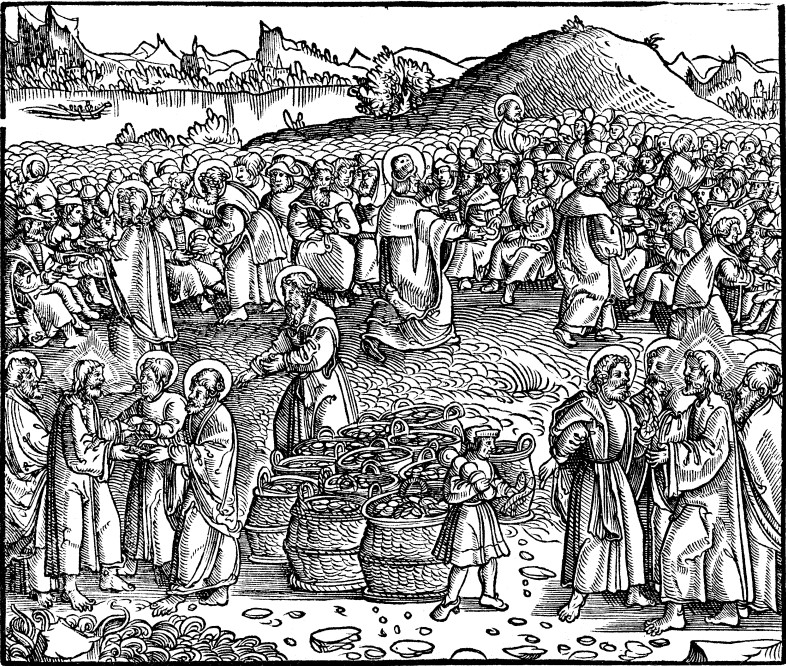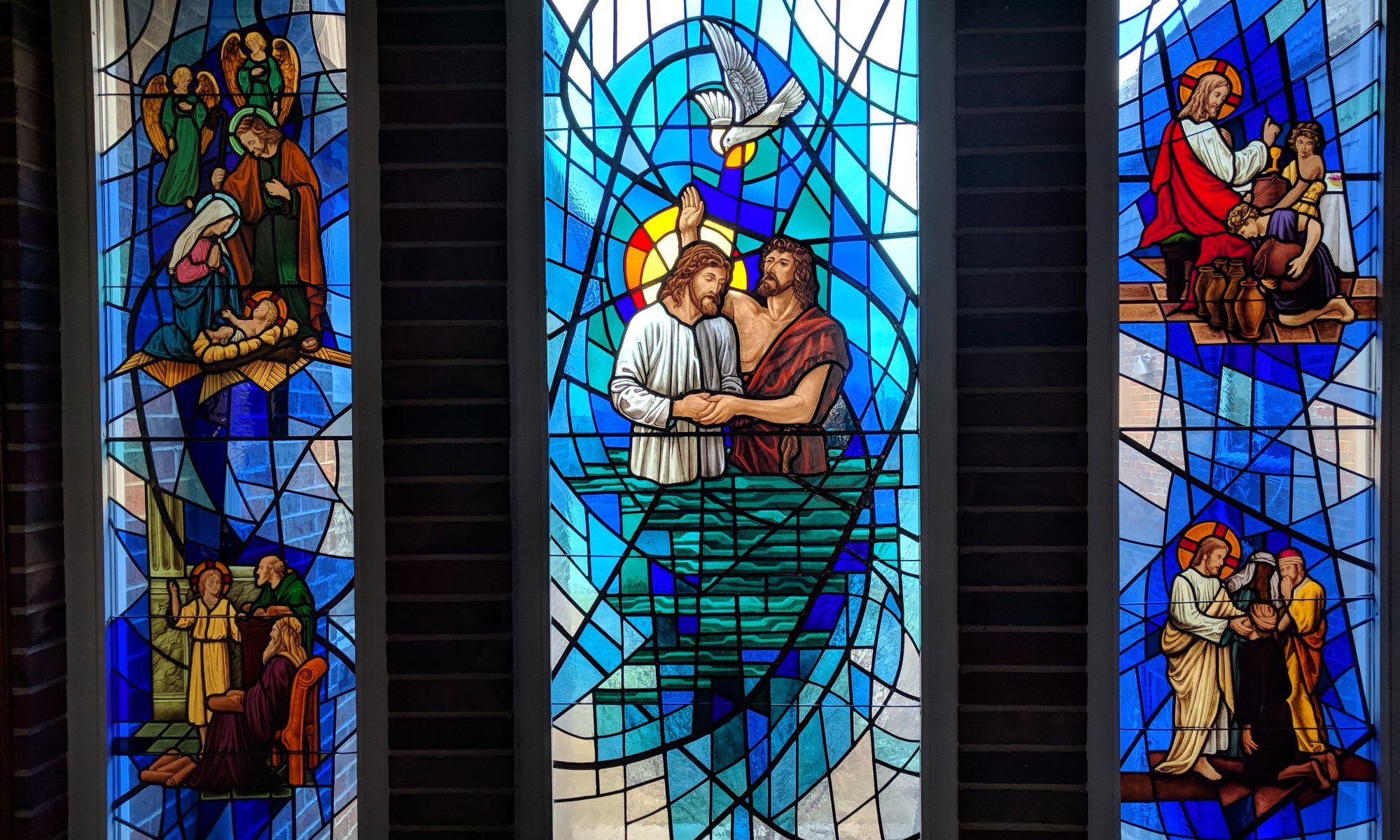
Lessons: Isaiah 49:8-13, Galatians 4:21-31, John 6:1-15
Hymns: LSB 454, 743, 774, 625, 661
Grace, mercy, and peace to you from God our Father and our Lord and Savior, Jesus Christ. Amen
Hanging out with Jesus is, from an earthly standpoint, risky. Despite this reality, many figure serene thoughts about what it would be like if they were around Jesus during His earthly ministry. They think, “Didn’t the disciples know this Man is God? Why didn’t they understand His sayings? How could Philip be so naïve in saying that 200 denarii aren’t enough to feed the crowd when money wasn’t even needed? Why did Andrew so doubt that 5 loaves of bread and 2 small fish would be enough? Why would Peter deny Jesus three times when he was taught that Jesus would be the victor over death and the grave? Since they heard Jesus rose from the dead, why were they hiding on Easter for fear of the Jews?”
It can be tempting to sit on our easy chairs, criticizing most of what the disciples said and did. We may dream about how we would have understood Jesus. But do we do any better? We know God’s laws and yet we break them. We hear God’s Word and then hold to the world’s teachings. We doubt whether God is working in our lives. Yet, we have the advantage of seeing everything from hindsight—in 20/20 vision.
At the same time, we are tempted to think that hanging out with Jesus would have been nothing but good times, peaceful living, easy and nice sayings, full of cheer, and a wonderful life. But just page through the Gospels. You will see that this normally is not the case. On multiple occasions, people tried to stone Jesus to death. In today’s Gospel they want to make Jesus king by force. Later in John 6 almost everyone turned their backs on Jesus and stopped following Him because they could not bear His teachings. So many left our Lord that He turns to the Twelve and says, “Will you also go away?” (v. 66-67)
What did Jesus say that was so offensive? He said that their fathers ate manna in the wilderness and are now dead. But Jesus is the Bread of Life. And if you feed on Him, you will live forever. The only way you can live forever is through Him (John 6:47-51).
Taking offense and grumbling at His teachings, the multitudes left Him. No more Jesus in their lives. No more hard sayings. No more disappointments that He isn’t doing what the crowds wanted.
Little has changed, hasn’t it? Many walk away from Jesus because they cannot bear His teaching. They neither want the Law, nor His grace. Or they assume God is the author of evil who brings calamity upon them. They have troubles seeing that God’s teachings are meant for our good—that God averts evil after evil in our lives—that eternal death awaits those whom God does not meet with His grace.
It makes no sense to get angry at God. He created this world and sustains life. He keeps this world—this universe—going. He provides out of His divine providence—just as Jesus provided for the 5,000. God not only created and sustains the world, but God came in the flesh to redeem us from all sin, from death, and from the power of the devil so that we can live forever. Jesus not only made this payment for our sin, but He has seen to it that we receive the benefits of His sufferings and death on the cross through the holy Word and blessed sacraments.
All of this is done out of God’s love for us. And if He loves us so much to do these things, how can we get angry at Him? How can we blame Him for bad times? God has averted many crises in our lives.
And when bad things happen, let them be. Rejoice that God has seen you fit to endure them. Know that these evils did not originate with God. Know that He is not the author of evil. Know that God will take care of you—as He took care of the 5,000.
Yet it is still risky to hang out with Jesus. Jesus fed the crowd even though He knew they would turn on Him. When He sent the Twelve to go out and preach the Word, He warned them of all the trials that would happen to them. In fact, He declared to them, “I send you out as sheep in the midst of wolves. Therefore, be wise as serpents and harmless as doves. But beware of men, for they will deliver you up to councils and scourge you in their synagogues. And you will be hated by all for My name’s sake. But he who endures to the end will be saved. When they persecute you in this city, flee to another” (Matt 10).
So much for a life of ease with cute sayings, good times, and lots of cheer. So much for Christianity as we tend to imagine it.
When Jesus was put to death, the disciples hid in fear. Their lives as Christians were difficult. They feared persecution. So, Jesus appeared to them and declared, “Peace be with you.” Thomas missed this event. Who knows where he was. So, the next week when the disciples were again behind locked doors, Jesus appeared to them again and declared, “Peace be with you.” This time Thomas was present and believed. And Jesus said, “Thomas, because you have seen Me, you have believed. Blessed are those who have not seen and yet have believed” (John 20:19-29). Or as it is written in 2 Corinthians 5:7, “We walk by faith, not by sight.”
Those teachings stand true today. We continue to live by faith. We do not live by sight. We can see the existence of God as everything turns green—the landscape went from white to brown to green. But in nature, we do not know what kind of a God He is. If we only searched nature for our knowledge of God, we would conclude that God is evil. When we hear of volcanoes and earthquakes and tsunamis, we may conclude that God is not a loving, merciful God of peace.
But when we hear who God really is in the Scriptures, then we know what kind of God He is. He is one who hears our prayers and answers them. He is one who reconciles the world to Himself through Christ Jesus. He is Immanuel—God with us.
So, we live by faith, not by sight. We don’t worry about hard times or difficulties we face. For we know that the sufferings of this present world do not compare to the glories which will be revealed in us.
Again, this is risky. But it is worth it. The world hates our faith. Our society is becoming increasingly hostile to Christianity. Face it, America has never been amiable to the pure teachings of God’s Word. American Christianity is hostile to infant baptism, the Sacramental Union, male only pastors, closed communion, and so on.
Yet, it is worth being a Christian because we have eternal life abiding in us. We have a God that has mercy on us, just as Jesus had compassion on the 5,000. We have a God who not only hears us, but answers our prayers according to His good and gracious will. We have God’s peace and love and favor. Since He is for us, who can be against us?
We risk a lot being Christian. We risk our status and honor in society. We risk part of our fortunes as we give generously back to God and to our neighbor. We risk our time as we make that weekly sacrifice of church attendance and as we make the daily sacrifice of devotions and prayer.
Look at what the boy risked who had the bread and fish. He had to walk by faith. He may not have known what was going on when some grown-up obtained from him his fish and bread. This may have been the only fish he managed to catch, and it may have been the only bread his family could afford to eat with their few possessions. We do not know the boy’s story. But the kind of bread he had—barley loaves—was the bread of peasants—the lowest class. He risked all when these grown-ups got his food from him to feed the coming crowd. He could have been left with nothing in return. He could have returned home empty-handed. And then what would his parents do?
In a sense, Andrew was right. What are five loaves and two fish among so many people? But Jesus performed a miracle with this boy’s small gift. He kept giving more and more food to the disciples to distribute to the people. Everyone ate what they wanted until they were full. No one had just crumbs. All ate a feast. And they collected twelve baskets of leftovers. God performed a great miracle!
The boy did not go home empty-handed. He was fed and satisfied. So were the 5,000. And the boy probably went home taking a basket or more of leftovers with him.
That is how our lives are lived in Christ. We call it stewardship. The Lord provides for us through our neighbors. God provides for others through us. We bring our imperfect and risky offerings. They are sanctified and used in God’s kingdom. They are pleasing to Him. And we do not go home empty-handed. We are fed and satisfied. So are those around us. We are fed with Christ in the Divine Service—the Bread of Life. And as we feed on Him, we shall live forever.
Our lives in Christ are centered around the Word and Sacraments. Our Lord feeds our bodies and souls with the Word and the Lord’s Supper. Without the Word and Sacraments, we are not fed; our souls die; and we lose our faith.
But with the Word and Sacraments, Christ gives us gifts far greater than enough food to feed 15,000 (adding women and children). In fact, He gives us treasures which cannot be valued. They are worth more than all the world’s gold and silver and oil. Because they give you eternal life. No amount of money can do that.
Jesus’ compassion is deeper than feeding people food. He is the Lamb of God who takes away the sin of the world. He was bruised by Satan and laid to rest in the earth. He gave up His life for you. He is the promised Prophet—the Word made flesh—to give you the words of eternal life. Because He rose and lives, you can live forever! Therefore, rejoice, O Christian! Jesus loves you! You have His peace. Amen.
The peace of God which passes all understanding keep your hearts and minds in Christ Jesus to life everlasting. Amen

